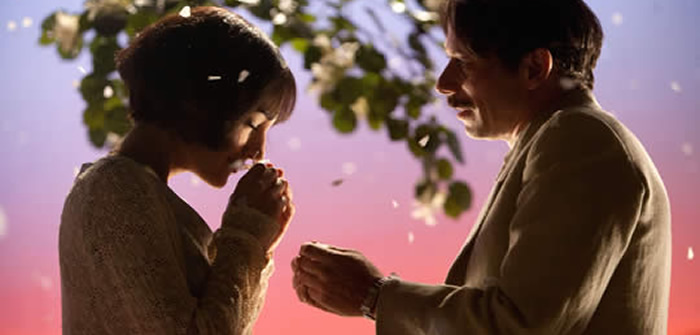Chicken With Plums takes place in Teheran, 1958. Since his beloved violin was broken, Nasser Ali Khan, one of the most renowned musicians of his day, has lost all taste for life. Finding no instrument worthy of replacing it, he decides to confine himself to bed to await death. As he hopes for its arrival, he plunges into deep reveries, with dreams as melancholic as they are joyous, taking him back to his youth and even to a conversation with Azraël, the Angel of Death, who reveals the future of his children… As pieces of the puzzle gradually fit together, the poignant secret of his life comes to light: a wonderful story of love which inspired his genius and his music…
Marjane Satrapi, director of Chicken With Plums was born in Iran. Having studied at the French lycée in Teheran, she furthered her studies in Vienna before settling in France in 1994. On arrival in Paris, she joined the Atelier des Vosges, a haunt of the big names in modern comic-book illustration.
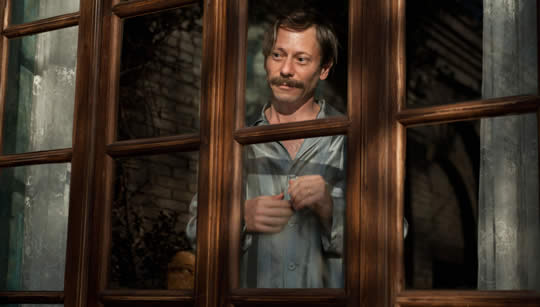
In her first novel, Persepolis 1, published by L’Association in November 2000, Marjane retraces part of her family’s history through the story of her first ten years until the fall of the Shah’s regime and the start of the Iran-Iraq war. The book received the prize for the best first album at the Angoulême festival. In Persepolis 2, released in October 2001, she recounts the Iran-Iraq war and her adolescence until her departure for Vienna aged 14. Persepolis 3 and Persepolis 4 tell of her exile in Austria and her return to Iran.
She has since published two further novels, Embroideries and Chicken with Plums. The latter won the 2005 prize for the best album at the Angoulême festival.
She has also published children’s books, notably Sagesses et malices de la Perse in partnership with Lila Ibrahim-Ouali and Bahman Namwar-Motalg, Monsters are Afraid of the Moon, Ulysse au pays des fous in partnership with Jean-Pierre Duffour, released in 2001; Ajdar, released in 2002 and Le Soupir, released in 2004.
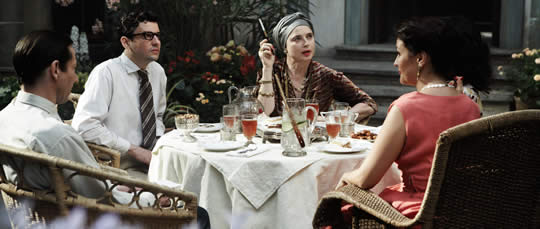 In 2009, she appeared in Riad Sattouf’s movie, Les Beaux Gosses (The French Kissers), co-wrote the lyrics of “Poney Rose” with Philippe Katerine for the album by Arielle Dombasle, Glamour à mort, and illustrated the cover of the Iggy Pop album Préliminaires.
In 2009, she appeared in Riad Sattouf’s movie, Les Beaux Gosses (The French Kissers), co-wrote the lyrics of “Poney Rose” with Philippe Katerine for the album by Arielle Dombasle, Glamour à mort, and illustrated the cover of the Iggy Pop album Préliminaires.
Chicken with Plums is her second full-length movie co-directed with Vincent Paronnaud after Persepolis
BijanTehrani: Did you want Chicken with Plums to play out like a dream?
Marjane Satrapi: Yes. I wanted it to be like a dream, but I also wanted it to be very realistic in the way that you can remember your life. When you lie down and you remember your life, you never remember it in chronological order—say, starting from being one year-old and finishing at the age of 55—you always have different moments of your life. You remember something here, and then something else, and all of that added together makes the life, so I wanted it to be realistic. Ismail is lying down and he is remembering, but at the same time there is imagination because the notion of dream is so important in our culture; the notion of poetry, dreams, and the things that we imagine with happiness and melancholy and broken hearts. I wanted to make it so that people would enter into the magic world of Nasser-Ali and they would stay with him for an hour and a half.
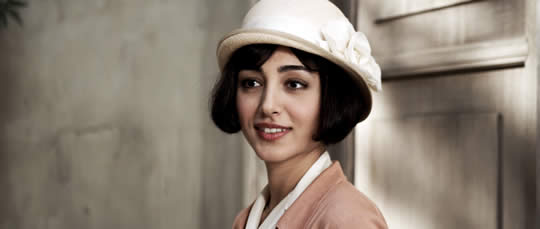
BT: I am originally from Iran, and this film—with its French actors and actresses, and its entire story in French—has been one of the best depictions of Iran that I have ever seen in a film.
MS: It makes me so happy to hear that. With some American films, it seems that they never bother to do the research; they wanted to do a film about Mozart, so they make Amadeus, and Amadeus speaks English not German. I am an Iranian person and I do not have 200 great Iranian actors in Paris that I can call and they can come and play in my movie. I want to have the best actors. Of course I work fast, but the question is the spirit and that’s why your statement makes me so happy. I wanted my lead to be an Iranian man, and he became an Iranian man, and Maria De Medeiros—she is Portuguese, but for me she is an Iranian wife and really no-matter the language you can evoke a nationality and it is not a problem; because we are Iranian we always have to speak Farsi and we don’t have to speak any other language. The question is the flare of the movie, the atmosphere, the culture: it is the feelings, it is all of that, and if you can have
BT: Your film brings the essence of Cinema Without Borders to life, and I think it is not important who plays what part, and where they are from. I have seen Persepolis maybe fifty times now, and I was always looking for more: something of that quality, and I was so happy to see your new film. I am also delighted to know that there is another part coming, please tell us about that.
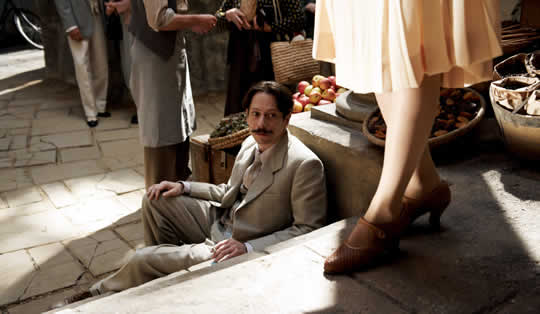 MS: I am making a trilogy that goes through history. First, there is Persepolis from 1975-1994, and most of this story happens in the late 80’s. Then I have another story that is from the beginning of the century: it is the story of my other grandmother, who actually escaped the house of her father dressed as a man. She did not want to marry the man that they chose for her because the guy had pimples on his face and she thought that he was too ugly to marry her—also, she was in love with my grandfather, so she escaped. In the Iranian family, you have a lot of drama, but the drama always comes with a lot of humor. There is so much drama that if they cannot laugh about it, it would be unbearable. I have to believe in the story that I am telling, and in the Iranian stories, they have this common theme where I haven’t seen one Iranian person in my life that led a “normal” life. I had never seen an Iranian that was born, went to school, was married, had two children and then died—there is always something incredible that happened in their life. It is because of our history, our culture, and the instruments of the people; because we are extreme in everything we do. I liked that, and these are the things that touch me and my whole life, and what I wanted to do. I love the name of your organization, Cinema Without Borders, because there shouldn’t be any borders. There is this idea that people want to divide the world into the East and West, the Muslims and the Christians, and this and that, it is not easy. When I look at my story— which is an Iranian story that is shot in Germany with actors that come from France and all around the world—it tells me that all this bullshit that they tell us about the clash of the cultures does not exist. I think our differences separate us, and it has been the goal of my life forever to unite us, so I will always work in this direction. I would like to do other things that have nothing to do with my own script, like working on someone else’s script, but when I do things for myself, I have to believe in my stories; they come from what I have heard and what has touched me the most.
MS: I am making a trilogy that goes through history. First, there is Persepolis from 1975-1994, and most of this story happens in the late 80’s. Then I have another story that is from the beginning of the century: it is the story of my other grandmother, who actually escaped the house of her father dressed as a man. She did not want to marry the man that they chose for her because the guy had pimples on his face and she thought that he was too ugly to marry her—also, she was in love with my grandfather, so she escaped. In the Iranian family, you have a lot of drama, but the drama always comes with a lot of humor. There is so much drama that if they cannot laugh about it, it would be unbearable. I have to believe in the story that I am telling, and in the Iranian stories, they have this common theme where I haven’t seen one Iranian person in my life that led a “normal” life. I had never seen an Iranian that was born, went to school, was married, had two children and then died—there is always something incredible that happened in their life. It is because of our history, our culture, and the instruments of the people; because we are extreme in everything we do. I liked that, and these are the things that touch me and my whole life, and what I wanted to do. I love the name of your organization, Cinema Without Borders, because there shouldn’t be any borders. There is this idea that people want to divide the world into the East and West, the Muslims and the Christians, and this and that, it is not easy. When I look at my story— which is an Iranian story that is shot in Germany with actors that come from France and all around the world—it tells me that all this bullshit that they tell us about the clash of the cultures does not exist. I think our differences separate us, and it has been the goal of my life forever to unite us, so I will always work in this direction. I would like to do other things that have nothing to do with my own script, like working on someone else’s script, but when I do things for myself, I have to believe in my stories; they come from what I have heard and what has touched me the most. 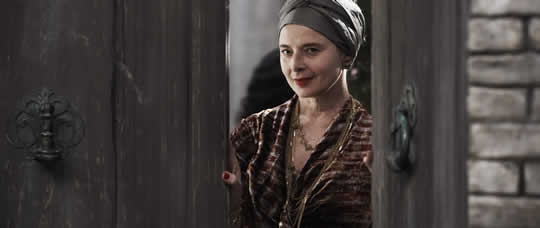
BT: Chicken with Plums has a wonderful fantasy element to it, while incorporating many characters that reflect real life individuals.
MS: Of course, it is not just the life story of Nasser-Ali. I saw a picture of him when I was 12, and my mother told me he was such a great musician and when he would play music people would stop their cars and listen to him. But the other part of the story is really the things that I have seen and heard or I have experienced myself. For example, there is a scene where they are in the bus and the child is singing, I did that when I was a child; we were traveling with my grandmother and my mother did not like her at all so I sang for 18 hours, non-stop and that caused my grandmother to never travel with us again and my mother was very happy, so these are things that I have experienced and I have now put them in the film.
BT: Another interesting aspect of Chicken with Plums is that you have so many actors with a variety of ways of acting and writing experience. There was a certain style of acting that everyone seemed to follow, how did you manage to make it happen?
MS: I work with the actors a lot, I don’t talk so much about the film and I don’t talk so much about the way they should act because I think that they are great actors. I talk more about the spirit of the family, I tell jokes, I tell stories etc. When everyone is around me and they laugh at the same story they just go in with a certain kind of mood.  They were very much in love with the project and committed. I am not really a bossy person I am not out there shouting this or that, I always convey myself in a smooth way and I think that they like it that we were laughing a lot and telling stories, I think that we were all very happy to spend these 9 weeks together.
They were very much in love with the project and committed. I am not really a bossy person I am not out there shouting this or that, I always convey myself in a smooth way and I think that they like it that we were laughing a lot and telling stories, I think that we were all very happy to spend these 9 weeks together.
BT: There is something about the history of cinema and the films that I really love and one of the directors that I loved a lot was Alfred Hitchcock and I think to me he is a very romantic filmmaker. Do you consider yourself a romantic filmmaker?
MS: Hitchcock it one of my favorite filmmakers. Yes, I consider myself a very romantic person, sometimes I get the feeling that I am not in the right time, I think that most of the times it bothers me, but at the same time it is good. This film has been sold and appreciated in many parts of the world, when I see that I see that there is a space in the world for these types of films. So we have to keep on making these kinds of films.
BT: What is your next project?
MS: I am actually working on the script of my trilogy, I don’t know if it is going to happen. I have been proposed with a script that is not mine, I think it will be a good artistic challenge, so I will first try to make this film and then I will try to work on my trilogy. Other than that I am preparing paintings for the month of January.

